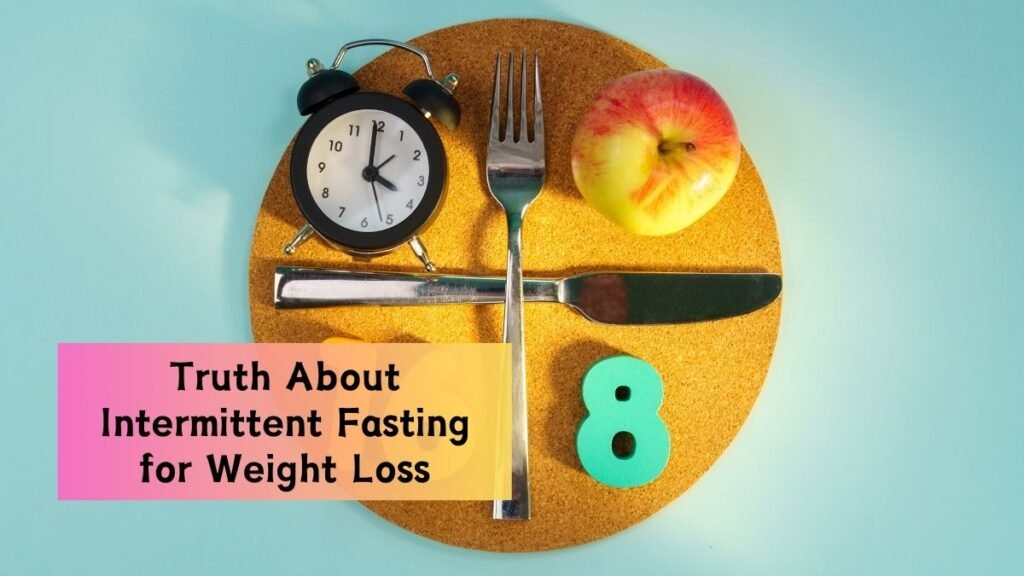Intermittent fasting (IF) has become a popular weight loss strategy in recent years, praised for its simplicity and potential health benefits.
But does it really work for weight loss? In this article, we’ll explore the latest research, facts, and figures on intermittent fasting to determine its effectiveness for weight loss and overall health.
What is Intermittent Fasting?
Intermittent fasting is not about what you eat but when you eat. It involves cycling between periods of eating and fasting. The most common methods include:
- 16/8 Method: Eating all your meals within an 8-hour window and fasting for the remaining 16 hours.
- 5:2 Diet: Eating normally for 5 days and restricting calories (around 500-600) for 2 non-consecutive days.
- Alternate-Day Fasting: Alternating between a day of eating normally and a day of fasting or eating very few calories.
- Eat-Stop-Eat: Fasting for 24 hours once or twice a week.
How Does Intermittent Fasting Work?

The primary mechanism behind intermittent fasting is its potential to reduce calorie intake without the need for calorie counting. When the eating window is restricted, people naturally tend to consume fewer calories, which can lead to weight loss.
Latest Research and Findings
1. Calories Matter More Than Timing
Recent research from Johns Hopkins University suggests that total calorie intake may be more critical than the timing of meals for weight loss. A study comparing time-restricted eating (TRE) to a regular eating pattern found that both groups experienced similar weight loss when calories were kept constant. This indicates that the effectiveness of intermittent fasting might be due to reduced calorie intake rather than the timing itself.
2. Long-Term Weight Loss
A study by the University of Illinois Chicago found that intermittent fasting can help people lose weight and keep it off over the course of a year. Participants practicing intermittent fasting lost about 5% of their body weight, which was comparable to those counting calories. The study highlighted that intermittent fasting might be easier to maintain in the long run due to its simplicity.
3. Health Benefits Beyond Weight Loss
Intermittent fasting may also offer health benefits beyond weight loss. A review published in the Annual Review of Nutrition highlighted potential improvements in gut health, reduced inflammation, and enhanced metabolic responses. These benefits could make intermittent fasting a holistic approach to improving overall health.
Pros and Cons of Intermittent Fasting
Pros
- Simple and Flexible: No need for calorie counting or meal planning.
- Potential Health Benefits: May improve metabolic health, reduce inflammation, and support gut health.
- Improved Adherence: Easier to maintain than traditional calorie-restricted diets.
Cons
- Not Suitable for Everyone: People with certain medical conditions, pregnant women, or those with a history of eating disorders should avoid fasting.
- Possible Side Effects: Can lead to hunger, irritability, and reduced concentration.
- Mixed Evidence: While many studies show benefits, some research indicates it may not be more effective than traditional diets for weight loss.
A Comparison of Intermittent Fasting Methods
| Method | Eating Window | Fasting Duration | Caloric Restriction | Recommended For |
|---|---|---|---|---|
| 16/8 Method | 8 hours | 16 hours | No | Beginners, people with flexible schedules |
| 5:2 Diet | Normal 5 days | 2 days | 500-600 calories | Individuals who prefer fewer fasting days |
| Alternate-Day | Normal 1 day | 24 hours | Very low calorie | People who want to lose weight quickly |
| Eat-Stop-Eat | Normal 5-6 days | 1-2 days | None | Those who can handle long fasting periods |
Conclusion
Intermittent fasting can be an effective tool for weight loss, primarily due to its potential to reduce overall calorie intake. While it may not offer advantages over traditional calorie counting for everyone, it provides a simpler and potentially more sustainable approach to dieting.
Beyond weight loss, intermittent fasting may also contribute to better metabolic health and reduced inflammation. As always, it’s essential to consult with a healthcare provider before making any significant changes to your diet.
FAQs
1. Is intermittent fasting safe for everyone?
Intermittent fasting is generally safe for healthy adults, but it is not recommended for people with certain medical conditions, pregnant women, or individuals with a history of eating disorders. Always consult a healthcare provider before starting any fasting regimen.
2. Can I drink beverages during fasting periods?
Yes, you can drink water, black coffee, or tea without added sugar or cream during fasting periods. These beverages do not break the fast and can help manage hunger.
3. How long does it take to see results with intermittent fasting?
Most people start noticing changes in weight within a few weeks. However, long-term, sustainable weight loss typically takes a few months. Consistency is key.
4. Does intermittent fasting cause muscle loss?
When combined with resistance training and adequate protein intake, intermittent fasting is unlikely to cause muscle loss. It’s essential to maintain a balanced diet to support muscle health.
5. Can intermittent fasting improve metabolic health?
Yes, intermittent fasting may improve various metabolic markers, including insulin sensitivity and inflammation. However, more research is needed to fully understand its long-term effects.
References
- Johns Hopkins University study on intermittent fasting and weight loss, April 2024.
- University of Illinois Chicago, research on long-term weight loss and intermittent fasting, June 2023.
- Annual Review of Nutrition, intermittent fasting and health changes, October 2021.



